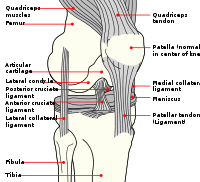UBERON:0008846
From FANTOM5_SSTAR
| Name: | skeletal ligament | ||
|---|---|---|---|
| Definition: | "Ligament organ that primarily consists of regular dense connective tissue aggregated into fasciculi; connects bone and cartilage organs. Examples: sutural ligament, ligament of pinna, tarsal ligament." [FMA:25624, Wikipedia:Ligament#Articular_ligaments] | ||
| Xrefs: |
| ||
| Synonyms: |
"articular larua" EXACT [Wikipedia:Ligament] "articular ligament" EXACT [Wikipedia:Ligament] "fibrous ligament" RELATED [Wikipedia:Ligament] "ligament" BROAD [VSAO:0000072, ZFA:0001675] "true ligament" EXACT [Wikipedia:Ligament] |
Ontology association<br>Each term has an is_a parent in the Uberon Ontology, which has a linkage to an another entity and FANTOM5 samples.Libraries were grouped into mutually exclusive facets according to the FANTOM5 sample ontology mapping to UBERON ontologies.<br><br>link to ontology dataset<br>data
Parents
| is_a: | UBERON:0000211(ligament) |
|---|---|
| part_of: | UBERON:0001434(skeletal system) |
Children
| is a: | UBERON:0003701 (calcaneal tendon),UBERON:0011088 (ligament of knee joint) |
|---|
Ontology Tree: Loaded from BioPortal
Ontorolgy tree(Small window open)
FF samples<br>It includes FANTOM5 samples that overlay the Uberon ontology
Human (Homo sapiens)
- 10264-104D3
- 10267-104D6
- 10292-104G4 (achilles tendon, donor2)
- 10295-104G7 (cruciate ligament, donor2)
- 10320-105A5
- 10323-105A8
Enrichment analysis: top 100 FFCP enriched with this ontology term TOP 100 FANTOM5 Cage Peaks enriched with UBERON:0008846 (skeletal ligament), sorted by p-values <br>Analyst: Hideya Kawaji<br><br>link to source dataset <br>human : data <br>mouse : data
No analysis results
Property "Property value" (as page type) with input value "UBPROP:0000001 "Dense regular connective tissue connecting two or more adjacent skeletal elements or supporting an organ.[VSAO]" xsd:string" contains invalid characters or is incomplete and therefore can cause unexpected results during a query or annotation process.
 200px-Knee_diagram.svg.png]
200px-Knee_diagram.svg.png]